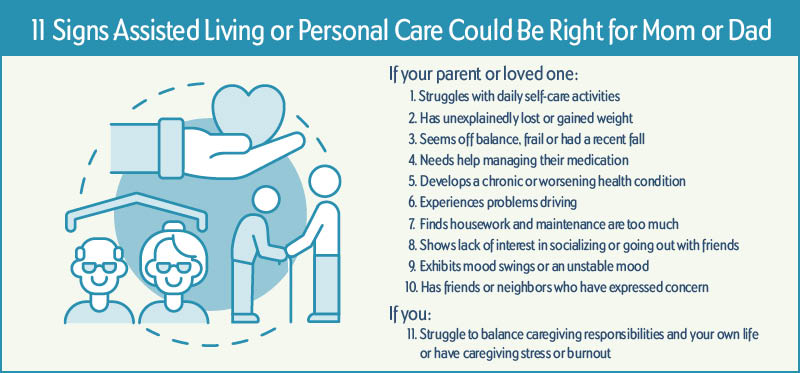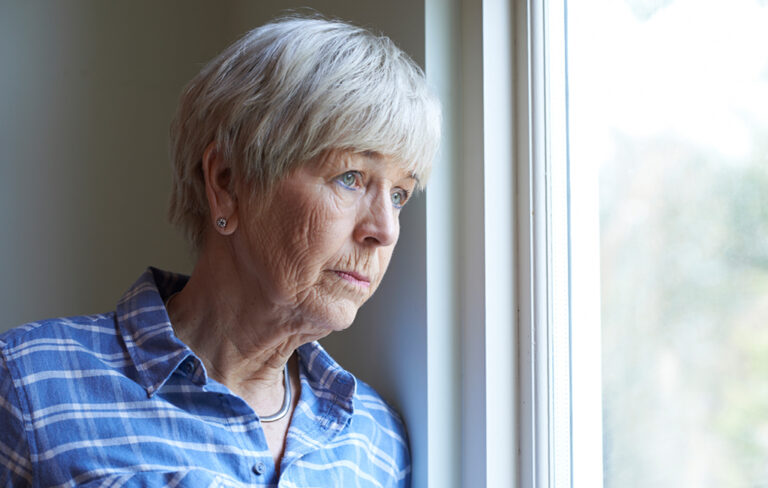If you’re worried about your parents or a loved one living alone as they age, you’re not alone. As the Boomer generations continues to age, more and more adult children are finding themselves becoming a caregiver or decision maker for an older relative.
On your next visit with them, pay attention to how they seem and what you see around you. Look for signs that they’re having difficulty with everyday tasks and caring for the home and themselves. Use the following list of telling questions that we’ve identified to help shed some insight as to their well-being and clues that a change in living arrangements may be on the horizon sooner than later.

1. Is your parent taking care of themselves? Can they manage daily activities?
Dressing, bathing, cooking, cleaning, doing laundry and running errands are all skills needed to lead an independent lifestyle. Are they taking care of themselves or have they stopped showering, doing their hair, etc? Are they still cooking and eating healthful meals? If your parent lacks the energy needed for self-care, it may indicate they are not ok living alone.
2. Do you see weight loss or gain? Are they eating well?
One of the most visible signs that something is amiss with an aging parent living alone is noticeable weight loss or gain. Has it changed in the past few months? Rapid changes can be a sign of a new or serious medical issue, or that they are struggling to prepare meals by themselves. Are they choosing balanced foods or remembering to eat meals and drink enough water? Are they eating mostly frozen meals or takeout? Do they have enough food in the house? Is there stale food in the fridge or food in the pantry with old expiration dates? Buying food and forgetting about it is common in older adults.
3. How well do they get around the house? Have they had a recent fall?
Does your parent seem frail? How well can they get up off a chair and walk? If they are unsteady when walking or have poor balance, this shows increased risk of their falling and sustaining a significant injury. If you spot bruises on your parent, it could speak to a bump or fall that they’ve failed to mention to you.
4. Are they having difficulty managing their medications?

Even with a daily pill sorter, does mom or dad seem to be missing taking their medications? This could be a sign of early memory issues. On the flip side, if you see that they are taking too many of a medication and needing a refill sooner, this could lead to other negative health effects. Errors in medication management can pose a real danger to seniors.
5. Do they have a chronic or worsening health condition?
Any decline in health can be a major concern. If you see your parent’s health deteriorating, they will likely need additional care in the near future to maintain their standard of living. If your parent had a recent medical scare, did they seek medical care or did you have to prompt them or take them to the doctor yourself? Ignoring a health issue or recovering more slowly from one can also be causes for concern.
6. Do they have problems driving?
Being able to drive supports one’s independence. Can your parent still get around safely on their own for errands, social outings, and doctor appointments? Dents and scratches in their car, or traffic tickets or accidents can signal worsening vision or depth perception, loss of motor skills, cognitive decline, or more. If you drive with them, do they naturally put on their seatbelt? Forgetting this may be a sign of memory decline. Do they still follow safe driving practices, or do they seem distracted with slow reaction times and drift from their lane? Are they forgetting where they were going or getting lost while trying to find their destination or way back home? These are signs that driving is becoming too dangerous for them. If your parent fears driving at night, or in busy traffic, this can limit their ability to care for themselves in their home.
7. Can they handle the housework and maintenance?
A house and yard that are not clean or maintained well is a sign that a parent is no longer able to perform the necessary tasks to do so. Is there clutter or piles of unopened mail? This could be a sign of mental decline, forgetfulness or even depression. Even if there are some of the chores of home ownership they enjoy, upkeep projects can cause undue stress on both seniors and their caregiver.
8. Do they still get out for social engagements or meet up with friends?
It’s common for seniors to discontinue social activities as they age, as they may be trying to hide declining health or cognitive decline. But isolating themselves from activities they use to enjoy and staying home all the time without social connection can cause depression and be associated with heart problems.
9. What is their mood or emotional state?
If you’ve witnessed your parent increasingly becoming more confused, flustered, annoyed or angry, there may be changes in their mental or physical health. How is their attention level? Do they seem unhappy or anxious? Their emotional state can impact their safety.
10. Have friends or neighbors noticed changes or expressed concerns?

Sometimes, caregivers don’t see the big changes occurring in an aging parent due to being so close to the situation. If a neighbor comments that they haven’t seen your parent in a while, that they’ve missed trash pick-up a few weeks in a row, or newspapers or mail don’t seem to be brought in timely, it’s worth talking to your parent about what help they need.
11. Who is the current caregiver and how are they managing?
While it’s natural to want to provide care for an aging parent or family member, it can be hard work, both emotionally and physically. As well, sometimes their care needs may exceed your abilities. Fatigue with juggling caregiving, work responsibilities and a personal or home life can lead to mood swings, poor judgement, and even depression. Caregivers are at serious risk for suffering health complications of their own too, due to missing their own medical appointments or taking the time they need for their own mental health. If you’re struggling to manage all the responsibilities as a caregiver, it may be time to look into getting help. Feelings of stress on the part of the caregiver can jeopardize the mother-daughter/son or father-daughter/son relationship that are long lasting.
We understand juggling your own life can be compounded with the needs of an aging parent. Acknowledging that a parent’s living situation needs to change for their personal safety, health or happiness can be difficult. If you’ve identified areas for concern and recognize some signs that your loved one may require some additional care, start the conversation today to help them maintain their independence while getting the support they need. Be sure to include them in the discussion, along with other family members as well as their physician, to voice your concern and offer them some solutions, such as Personal Care or Assisted Living.
While reviewing your options, most importantly, make sure both current needs and future health care needs can be met. This will avoid having to make another decision and move later on if their needs change.
As a Life Plan Community in southcentral Pennsylvania, SpiriTrust Lutheran has served the needs of seniors for the past seven decades with a continuum of care, including skilled care and short-term rehabilitation. Recognized locally and nationally among the best of the best, our Life Plan Communities, with Personal Care Residences plus Assisted Living and Memory Care Neighborhoods, can help you enjoy more time as a daughter or son … with less worrying.
Interested in learning more about personal care or assisted living at SpiriTrust Lutheran?
Contact the community of your choice to schedule a personal tour.
Assisted Living & Memory Care – York, PA
THE VILLAGE AT SPRENKLE DRIVE
1802 Folkemer Circle • York, PA 17404
717-819-3166 • smuir@spiritrustlutheran.org
Personal Care – Chambersburg, Gettysburg, Hanover, Shrewsbury & York
THE VILLAGE AT LUTHER RIDGE
2998 Luther Drive • Chambersburg, PA 17202
717-261-1251 • lsattazahn@spiritrustlutheran.org
THE VILLAGE AT GETTYSBURG
1075 Old Harrisburg Road • Gettysburg, PA 17325
717-334-4443 • jkeefer@spiritrustlutheran.org
THE VILLAGE AT UTZ TERRACE
2100 Utz Terrace • Hanover, PA 17331
717-646-2420 • lmerwede@spiritrustlutheran.org
THE VILLAGE AT SHREWSBURY
800 Bollinger Drive • Shrewsbury, PA 17361
717-227-3093 • nweekley@spiritrustlutheran.org
THE VILLAGE AT KELLY DRIVE
750 Kelly Drive • York, PA 17404
717-819-3166 • smuir@spiritrustlutheran.org


